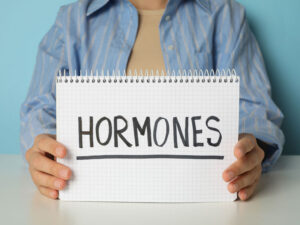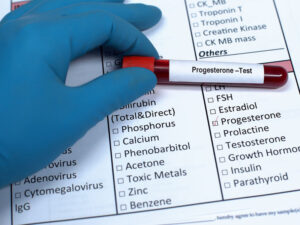
Hormones are crucial in regulating your body functions – from metabolism and mood to reproductive health and energy levels.
That means if your hormones are balanced, you’ll often feel vibrant and full of life. On the other hand, any disruption in your hormones takes a toll on your health and well-being. But thanks to science and medicine, there’s hope available with bioidentical hormone replacement therapy, like BioTe.
BioTe hormone pellet therapy is an innovative treatment using bioidentical hormone pellets – small, custom pellets that release consistent doses of compounded bioidentical hormones. They provide a balanced and sustained delivery of hormones to your body.
This comprehensive guide will describe BioTe hormone pellet therapy, exploring how it works, its benefits, the procedure, and what you can expect throughout your treatment journey.
Whether you’re new to bioidentical hormone replacement therapy or seeking an alternative to your current hormone treatment, keep reading to get some valuable insights. We want to help you make an informed decision about whether compounded hormones are for you.
Let’s start by understanding hormones and their impact on your quality of life.
Table of Contents
Overview of Hormones and Their Role in Your Body
Causes of Hormone Imbalance
What is Bioidentical Hormone Replacement Therapy (BHRT)?
BioTe Hormone Pellet Therapy
What Hormones Can BioTe Pellets Replace?
Hormone Pellet Therapy Pros and Cons
Hormone Pellet Therapy Weight Loss
Potential Side Effects and How to Manage Them
Who Should Avoid Hormone Pellet Therapy?
Overview of Hormones and Their Role in Your Body
Your hormones control your life: Think of sleep patterns, libido, energy, metabolism, you name it.
These chemical messengers – produced by some of your glands and your endocrine system – travel through your bloodstream to your tissues and organs, delivering messages that regulate many vital bodily functions, including:
- Growth and development
- Metabolism
- Sexual function
- Reproduction
- Mood
- Sleep
So, when your hormones are balanced, they work together to promote your health, like a hormone orchestra, in which each hormone has its own part to play. This ensures your body functions smoothly and you feel healthy and energetic.
However, if one hormone level is too low or too high, the rest descend into hormonal imbalance. Any imbalance can significantly affect your quality of life, leading to both physical and emotional challenges and menopausal symptoms like:
- Fatigue
- Weight gain or loss
- Mood swings
- Low libido
- Hot flashes
- Night sweats
- Irregular menstrual cycles
- Difficulty sleeping
- Decreased muscle mass
Causes of Hormone Imbalance
Hormonal imbalances occur for various reasons, and understanding these causes helps you address and manage the symptoms effectively. So, here are some of the main reasons:
Aging
As you age, hormone production naturally declines. If you’re a woman, this is most noticeable during menopause when estrogen and progesterone levels drop significantly. Men experience a gradual decrease in testosterone levels, often referred to as andropause.
Stress
Prolonged stress can lead to elevated cortisol levels, your body’s primary stress hormone. Chronic high cortisol can disrupt the balance of other hormones in your body, causing fatigue, weight gain, anxiety, and impaired immune function.
Poor Diet and Nutrition
Diets lacking essential nutrients can affect hormone production and balance. For instance, insufficient intake of healthy fats can impair the production of steroid hormones like estrogen and testosterone.
Medical Conditions
Conditions like polycystic ovary syndrome (PCOS), diabetes, hypothyroidism (underactive thyroid), or hyperthyroidism (overactive thyroid) directly affect hormone levels and metabolism. They cause weight changes, fatigue, hair loss, and temperature sensitivity.
So, do you need to accept hormone imbalance as part of growing older? Absolutely not. You can count on bioidentical hormones and pellet therapy to help you out.
Fortunately, bioidentical hormone replacement therapy (BHRT) – such as BioTE bioidentical hormone therapy – can help address these hormonal imbalances by providing a consistent and controlled release of bioidentical hormones tailored to your needs.
What is Bioidentical Hormone Replacement Therapy (BHRT)?
Bioidentical hormone replacement therapy is a form of hormone replacement therapy that uses bioidentical hormones. These are chemically identical to those your body produces.
Bioidentical hormones derive from plant sources and mimic the molecular structure of your body’s natural hormones, allowing for better compatibility and effectiveness.
BHRT involves using these bioidentical hormones to restore optimal hormone levels if you’re experiencing imbalances. The bioidentical hormones include estrogen, progesterone, testosterone, and others, depending on your specific needs.
Now, let’s focus on BioTe hormone pellet therapy, a popular and highly effective form of bioidentical hormone replacement therapy.
BioTe Hormone Pellet Therapy
As mentioned, BioTe hormone pellet therapy is a form of bioidentical hormone replacement therapy. It uses small, custom pellets – a form of compounded hormones – to deliver compounded bioidentical hormones consistently and effectively directly into your bloodstream over an extended period.
The tiny, rice-sized hormone pellets are made from bioidentical hormones derived from natural plants like soy and yams.
Because the hormone pellets are compounded, the bioidentical hormones in your customized hormone replacement therapy are specifically appropriate for you. This means they’re exactly what your body needs, after assessment by your doctor. This ensures better compatibility and effectiveness and meets your specific hormonal needs.
How Do BioTe Hormone Pellets Work?
The process of BioTe bioidentical hormone therapy involves the following steps:
1 Initial Consultation and Testing
Your healthcare provider thoroughly evaluates your symptoms, medical history, and hormone levels through blood tests and clinical analysis.
Based on the test results and assessment, they’ll create a personalized hormone replacement plan to address your specific needs. If your doctor agrees that BioTe pellet hormone therapy is a good fit for you, they’ll schedule the hormone pellet insertion.
2 Pellet Insertion
The healthcare provider inserts hormone pellets under your skin, typically in the fatty tissue of the buttocks or hips, in a minimally invasive procedure. This takes only a few minutes and takes place in-office, under local anesthesia.
During the procedure, your doctor will make a small incision in the numb area and insert the hormone pellets using a special device. The incision is then closed with a sterile strip or small bandage, and you can return to your daily activities.
What should you expect during and after the procedure?
While it’s a minor, safe, and typically painless procedure, there’s still a slight possibility of infection of the area or an expelling of the hormone pellets. This might cause temporary discomfort, swelling, or bruising.
This is why following your doctor’s recommendations for the post-procedure is essential – which may include avoiding submerging the area in water for the first few days. You should be able to remove the strips within 5 to 7 days.
3 Hormone Release
Once inserted, the hormone pellets release a steady, physiologic dose of bioidentical hormones directly into your bloodstream. This consistent release avoids the peaks associated with other forms of hormone replacement therapy like pills, creams, or injections.
In addition, your cardiac output regulates the hormone levels in your bloodstream, meaning your body can draw more hormones when needed (e.g., during stress or physical activity) and less when at rest.
4 Follow-Up and Monitoring
Once you’re all set with your pellets, your doctor will closely follow up your treatment with regular appointments and blood tests to monitor hormone levels to ensure optimal dosage. They’ll also check or manage any side effects.
Your pellets will be replaced every 3 to 6 months, depending on your absorption rates and hormone needs.
What Hormones Can BioTe Pellets Replace?
The bioidentical hormones from BioTe pellets primarily replace the following essential hormones:
Estrogen
Estrogen regulates the female reproductive system, maintaining bone density, cardiovascular health, and secondary sexual characteristics.
BioTe estrogen pellets can help alleviate menopausal symptoms such as hot flashes, night sweats, mood swings, and vaginal dryness – while also supporting bone and heart health.
Testosterone
Testosterone is vital for both men and women, affecting libido, muscle mass, bone density, mood, and energy levels.
BioTe testosterone pellet implants can improve sexual desire and function, increase muscle mass and strength, enhance mood and energy, and support overall well-being in both men and women.
Progesterone
Progesterone helps regulate the menstrual cycle, support pregnancy, and balance the effects of estrogen. In women, BioTe progesterone pellets can help manage symptoms of estrogen dominance, such as mood swings, irritability, and weight gain, and support overall hormonal balance.
Hormone Pellet Therapy Pros and Cons
If you’re a menopausal woman or anyone suffering from uncomfortable symptoms of hormone imbalance, you may be a good candidate for BioTe bioidentical hormone therapy.
However, as with any medication, this type of bioidentical hormone replacement therapy may also present some potential risks and side effects.
Here are the pros and cons of BioTe hormone therapy so you can decide whether pellet therapy with bioidentical hormones is a good fit for your specific needs.
Pros of Hormone Pellet Therapy
- Consistent Hormone Levels: BioTe pellet hormone therapy provides a steady release of bioidentical hormones, reducing the risk of fluctuations and ensuring a more stable hormone balance.
- Convenience: With pellets needing replacement only every few months, BioTe pellet hormone therapy is convenient and reduces the need for daily or weekly hormone administration.
- Improved Symptom Relief: Patients who use pellet hormone therapy often experience significant improvements in symptoms such as fatigue, mood swings, decreased libido, sleep disturbance, and weight gain.
- Customized Treatment: Each pellet is customized with compounded bioidentical hormones to meet your specific hormonal needs, ensuring a personalized approach to hormone replacement therapy.
Cons of Hormone Pellet Therapy
- Surgical procedure: Implanting the pellets requires a minor procedure, which carries risks such as infection, bleeding, or tissue damage.
- Lack of reversibility: Once the pellets are implanted, they cannot be easily removed. This means you need to wait at least three months for the following incision procedure, even if you experience adverse effects or change your mind about hormone therapy.
- Possible side effects: While some individuals experience minimal side effects with bioidentical hormones, others may experience symptoms such as breast tenderness, acne, or changes in mood or libido.
Before considering BioTe pellet hormone therapy or any form of hormone replacement, it’s essential to consult with your healthcare provider to discuss your individual needs, risks, benefits, and alternatives.
Hormone Pellet Therapy Weight Loss
As weight gain is another common hormone imbalance symptom, you may ask if the bioidentical hormones from BioTe hormone replacement therapy may help boost your metabolism to support weight management.
And it makes sense.
BioTe pellet hormone therapy helps address these imbalances, providing direct and indirect benefits for weight loss and overall metabolic health. Thus, it supports your metabolism by:
- Regulating key hormones
- Boosting energy levels
- Improving mood and sleep quality
However, for optimal results, combining BioTe pellet therapy with a balanced diet and regular exercise is essential. This holistic approach can help you achieve your weight management goals, enhance overall health, and improve your quality of life.
Potential Side Effects and How to Manage Them
Now, let’s talk about safety.
BioTe pellet hormone therapy offers many benefits, but like any hormone treatment, it’s crucial to understand its safety profile and potential side effects. Here are some common concerns and considerations to help you make an informed decision.
Are BioTe Pellets Safe?
BioTe pellets are generally considered a safe method of hormone therapy when administered by a qualified healthcare provider. The pellets come from bioidentical hormones, which are chemically identical to those the human body produces. This bioidentical nature often leads to better compatibility.
Most Common Side Effects of Pellet Hormone Replacement Therapy
Initial Hormone Fluctuations
You may experience temporary side effects such as mood swings, headaches, or fatigue as your body adjusts to rebalanced hormone levels.
These symptoms usually resolve within a few weeks. Regular monitoring and follow-up can help manage and mitigate these effects.
Insertion Site Reactions
As mentioned, there’s a slight chance you may experience mild bruising, swelling, redness, or infection at the pellet insertion site.
Ensuring proper insertion technique and post-procedure care, such as keeping the area clean and dry, can minimize these risks. Contact your provider if you notice signs of infection.
Minimizing Risks of Pellet Hormone Replacement Therapy
To minimize the risks of hormone therapy, you should first choose a certified provider experienced in compounded hormones to ensure proper evaluation, dosing, and insertion techniques.
As part of the pellet therapy protocol, you must also attend regular follow-up appointments and blood tests to monitor and adjust dosages as needed.
You can support overall treatment efficacy and reduce the risk of side effects by adopting a healthy lifestyle – including a balanced diet, regular exercise, adequate hydration, and sufficient sleep.
Who Should Avoid Hormone Pellet Therapy?
BioTe pellet hormone therapy is not suitable for everyone. Certain individuals should avoid pellet therapy. For example, pregnant or breastfeeding women and individuals with certain medical conditions, including:
- Hormone-sensitive cancer
- A history of blood clots
- Thyroid or adrenal disorders
- Liver disease
Pellet Hormone Therapy at Stella Mattina
Instead of searching online for “pellet hormone therapy near me,” call and talk to us at Stella Mattina. We’re focused on women’s health – and are specialists in compounded bioidentical hormones and hormone replacement therapy.
Our preferred method is BioTe pellet hormone therapy because of all the benefits. But we know you’re unique, and it’s your choice. Our team is happy to guide you through your journey.
If you’d like to talk about pellet therapy and personalized bioidentical hormones, schedule your consultation today.
Dr. Krum is currently in practice in Arlington, TX. He received his undergraduate degree at Texas A&M University, then attended UTMB Galveston for medical school, finishing in 1986, completing his residency there in 1990. Providing a full range of obstetrical and gynecological care, he specializes in the treatment of endometriosis and robotic surgery. He arranges his schedule so that same-day appointments are usually available.






